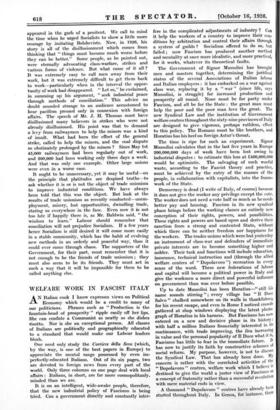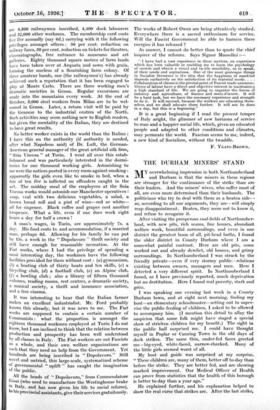WELFARE WORK IN FASCIST ITALY
AN Italian cook I know expresses views on Political Economy which would be a credit to many of our politicians. Phrases such as " Production is the fountain-head of prosperity " ripple easily off her lips. She can confute a Communist as neatly as she dishes risotto. Nor is she an exceptional person. All classes of Italians are politically and geographically educated to a standard that would make our Labour leaders blush.
One need only study the Corriere della Sera (which, by the way, is one of the best papers in Europe) to appreciate the mental range possessed by even im- perfectly-educated Italians. Out of its six pages, two are devoted to foreign news from every part of the world. Only three columns on one page deal with local affairs : Italians, in short, are far more cosmopolitanly- minded than we are.
It is on an intelligent, wide-awake people, therefore, that the new industrial policy of Fascismo is being tried. Can a government directly and constantly inter- fere in the complicated adjustments of industry ? Can it help the workers of a country to improve their con- ditions by arbitration and control their affairs through a system of guilds ? Socialism offered to do so, but failed ; now Fascism has produced another method and mentality at once more idealistic, and more practical, for it works, whatever its theoretical faults.
The Government of Signor Mussolini has brought men and masters together, determining the juridical status of the several Associations of Italian labour and Italian employers : it has embarked on a war against class war, replacing it by a " war " (since life, says Mussolini, is struggle) for increased production and prosperity all round. None must be for party under Fascism, and all be for the State : the great man must help the poor and the poor man love the great. The new Syndical Law and the institution of Government welfare centres throughout the sixty-nine provinces of Italy are designed to give vigorous, perhaps ruthless, effect to this policy. The Romans must be like brothers, and Horatius has his heel on foreign Astur's throat.
The time is ripe for such an experiment. Signor Mussolini calculates that in the last five years in Europe 200,000,000 days of work have been lost owing to industrial disputes : to estimate this loss at 2400,000,000 would be optimistic. The salvaging of such woeful waste, according to the Fascist theory and practice, must be achieved by the entry of the masses of the people, in collaboration with capitalists, into the frame- work of the State.
Democracy is dead (I write of Italy, of course) because it does not give the worker any privilege except the vote. The worker does not need a vote half so much as he needs better pay and housing. Fascism in its new syndical phase brings before the working classes an entirely new conception of their rights, powers, and possibilities. These rights and powers are based upon and derive their sanction from a strong and contented State, without which there can be neither freedom nor happiness for the workers. The trades unions which were but yesterday an instrument of class-war and defenders of immediate private interests are to become something higher and nobler. Their task and functions will include education, insurance, technical instruction and (through the allied welfare centres of " Dopolavoro ") recreation in every sense of the word. These new federations of labour and capital will become a political power in Italy and give the workmen a more direct and powerful influence on government than was ever before possible.
Up to date Mussolini has been Horatius—" still his name sounds stirring " ; every village has " Il Duce Salvo " chalked somewhere on its walls in thankfulness for his recent escape, and even in Rome I noticed crowds gathered at shop windows displaying the latest photo- graph of Horatius in his harness. But Fascismo has now entered on a new and decisive phase in its history : with half a million Italians financially interested in its continuance, with trade improving, the lira increasing in value and the personal popularity of Il Duce what it is, Fascismo has little to fear in the immediate future. It has now to justify its faith by constructive schemes of social reform. My purpose, however, is not to discuss the Syndical Law. That has already been done. MY concern is rather with the correlated activities of the " Dopolavoro " centres, welfare work which I believe is destined to give the world a juster view of Fascism° as a concept of fraternity rather than a successful revolution with mere material ends in view.
A thousand " Dopolavoro " centres have already been started throughout Italy. In Genoa, for instance, there are 8,800 railwaymen inscribed, 4,400 dock labourers and 52,000 other workmen. The membership card costs five lire annually (say 6d.) carrying with it the following privileges amongst others : 50 per cent. reduction on railway fares, 50 per cent. reduction on tickets for theatres, cinematographs, free entrance to museums and art galleries. Eighty thousand square metres of farm lands have been taken over at Arquata and sown with grain, forming the nucleus of a flourishing farm colony. Of three amateur bands, one (the railwaymen's) has already achieved such a reputation that it has been engaged to play at Monte Carlo. There are three working men's dramatic societies in Genoa. Regular excursions are made into the mountains every week. At the end of October, 3,000 steel workers from Milan are to be wel- comed in Genoa. Later, a return visit will be paid by the Genoese to the industrial centres of the North. Such activities may seem nothing new to English readers, but given the mentality of the Italian, they are destined to have great results.
No better worker exists in the world than the Italian : I have this on the authority (if authority is needed, after what Napoleon said) of Dr. Luft, the German- American general manager of the great artificial silk firm, " Snia Viscosa " at Turin. I went all over this estab- lishment and was particularly interested in the dormi- tories for one thousand working girls. Astonishing to me were the notices posted in every room against smoking : apparently the girls even, like to smoke in bed, when a fine of ten lire is inflicted on offenders caught in the act. The midday meal of the employees at the Snia Viscosa works would astonish our Manchester operatives : soup, veal with two delicious vegetables, a salad, a brown bread roll and a pint of wine—red or white— all for sixpence. Black coffee and grapes cost another twopence. What a life, even if one does work eight hours a day for half a crown !
A man's wages, in Turin, are approximately 7s. a day. His food costs ls. and accommodation, if a married man, perhaps 6d. Allowing for his family he can put by 15s. a week in the " Dopolavoro " thrift society and still have enough for reasonable recreation. At the Fiat works, where I had the privilege of spending a most interesting day, the workmen have the following facilities provided for them without cost : (a) gymnasium, (b) a boating club of thirty boats and ten skiffs, (c) a bicycling club, (d) a football club, (e) an Alpine club, (f) a bowling club ; also a library of fifteen thousand volumes, reading rooms, rest centres, a dramatic society, a musical society, a thrift and insurance association, and a free cinema.
It was interesting to hear that the Italian farmer makes an excellent industrialist. Mr. Ford probably knows this already, but it was news to me. The Fiat works are supposed to contain a certain number of Communists : what the proportion is amongst the eighteen thousand workmen employed at Turin I do not know, but I am inclined to think that the relation between production and prosperity has been well understood by all classes in Italy. The Fiat workers are not Fascists as a whole, and their own welfare organizations are such that they need no help from the Government. Yet hundreds are being inscribed in " Dopolavoro." Still novel and untried, this large-scale, systematized scheme of governmental " uplift " has caught the imagination of the public.
.All the heads of Dopolavoro," from Commendatore Omni (who used to manufacture the Westinghouse brake in Italy, and has now given his life to social reform), to his provincial assistants, give their services gratuitously. The works of Robert Owen are being attentively studied. Everywhere there is a sacred enthusiasm for service. Will the Fascist Government be able to harness these energies it has released ?
As answer, I cannot do better than to quote the chief inspirer of the reforms. Says Signor Mussolini :- " I have had a vast experience in these matters, an experience which has been valuable in enabling me to learn the psychology of crowds and obtain a visual and tactile sensibility, so to speak, of their needs and aspirations. One of the most grotesque things in Socialist literature is the idea that the happiness of mankind depends exclusively on the satisfaction of its material needs.. . . Collaboration of classes is the pivotal point of Fascist trade unionism. Givers of labour have a direct and objective interest in maintaining a high standard of life. We are going to organize the forces of industry and agriculture, of finance and main-d'oeuvre. It will be a hard task, but we have the necessary experience and strength to do it. It will succeed, because the workers are educating them. selves and we shall educate them further. It will not be done in a day, but this is a beginning."
It is a great beginning if I read the present temper of Italy aright, the glimmer of new horizons of service to man and a happier social life, which, given an educated people and adapted to other conditions and climates, may permeate the world. Fascism seems to me, indeed, a new kind of Socialism, without the twaddle.
F. YEATS-BROWN.























































 Previous page
Previous page